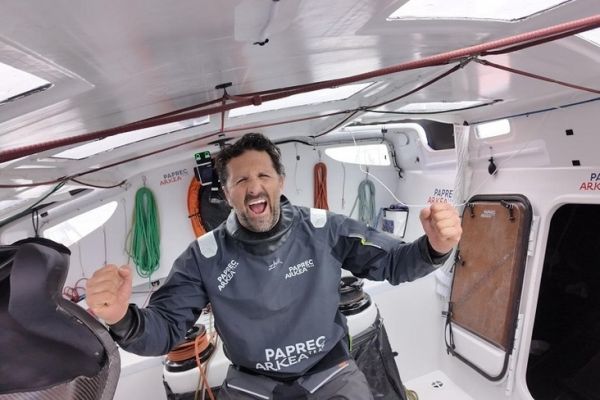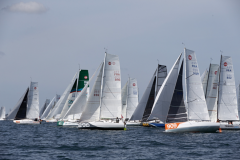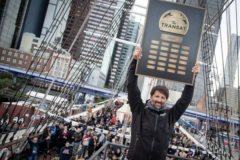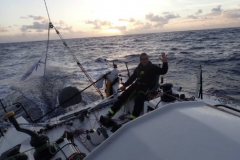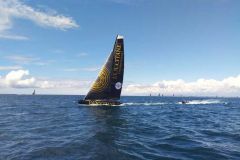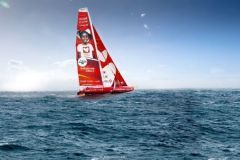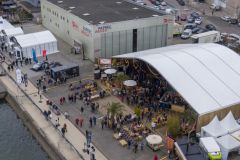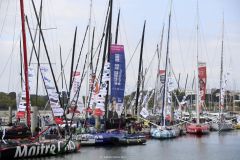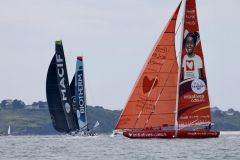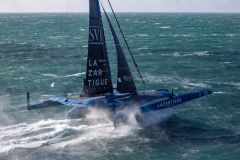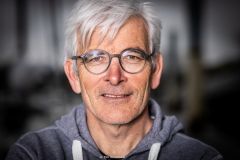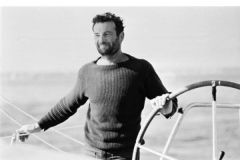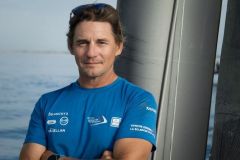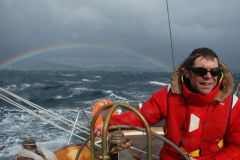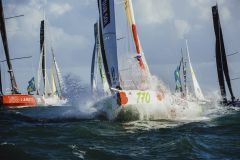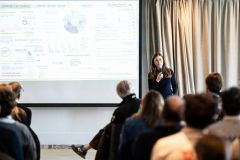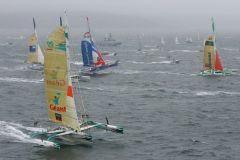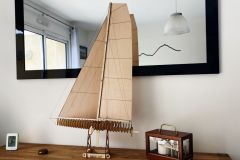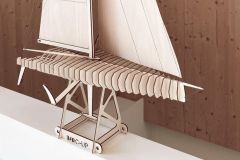Yoann Richomme, skipper of the IMOCA Paprec Arkea, wins this 2024 edition of The Transat CIC this Monday, May 6, 2024 at 20 h 23 et 32 minutes French time after 8 days 6 hours 53 min 32 seconds at an average speed of 14.83 knots, sailed over a course of 3,293.55 miles.
A downwind race, unusual for The Transat CIC
Setting out from Lorient on Sunday, April 28, 2024, in clement conditions, Yoann Richomme was among the frontrunners right from the start. With a northerly position to get the best angle for the rest of the race, the navigator had to contend with a windy event on April 30, forcing him to reduce sail. The following day, the weather offered downwind conditions in the breeze, forcing him to spend 24 hours in his bunks for protection. Unusual conditions for the sailor, who explained after a week's racing: "After a week's racing, the most striking thing is that historically it's an upwind race and we've hardly done any upwind. A bit at the beginning, so it's quite exceptional. So it's good training for the Vendée Globe, in terms of temperature, onboard equipment, cold-weather gear, and the super-interesting pace of the race, with a low-pressure system rounding from the north, which is unusual when you're coming from France. These are atypical conditions for an English transatlantic race. It's really nice. We were expecting to sail upwind in 40 to 50 knots, and we ended up sailing downwind in not even 40 knots."
After spending more than 24 hours in his bench to protect himself, and a lot of technical maneuvering, Yoann was able to take advantage of lighter downwind conditions to inspect his boat. He explained: "It's pretty exciting. These are conditions I know and my boat is made for it. It's more pleasant. We're still in a very tight pack. There are still a lot of people around. It's intense right to the end."
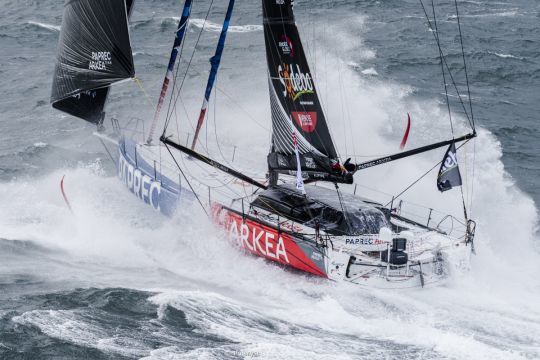
Leading the fleet from May 2, 2024
May 2 marked a decisive turning point in the navigator's race. After a night of skimming squalls at 40 knots and heavy seas - a washing machine as the sailor puts it - he was about to aim for the eye of the low-pressure system and gybe just ahead. All of a sudden, the atmosphere changed to make way for the sun, but above all to leave him in first place, held until then by Charlie Dalin. The skipper of IMOCA Macif, victim of a sluggish start, had lost quite a lot of ground, leaving Yoann Richomme the opportunity to take first place in the race. He confided at the time: "Being in the lead of The Transat will remain a ticked box. It's mainly due to Charlie's misfortune, who went down in the dumps last night. We're going to try to hold on to the ranking even if there's a lot to play for until the finish."
The remainder of the trip - around 80% - was downwind fractional, with a bit of sea, conditions particularly suited to the navigator. With temperatures hovering around 3°C, the skipper had to reduce the number of sail changes, but it proved to be good training for the Vendée Globe. He explains: "Maybe it's these kinds of conditions I'd encounter in the Deep South, even if it seems particularly extreme."
The sailors then had to deal with a fairly large exclusion zone, to avoid colliding with marine mammals. A constraining factor right up to the finish, it forced Yoann to carry out a number of gybes, in the same way as the ice exclusion zone in the south of the Vendée Globe.
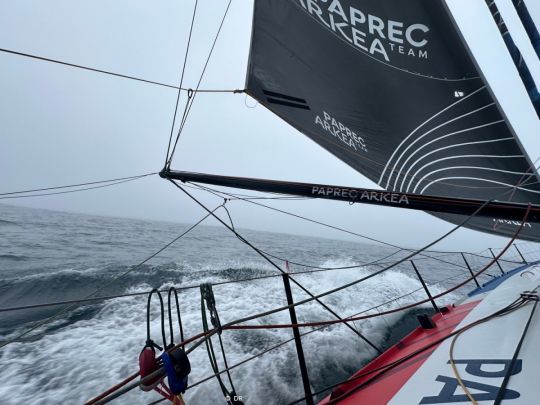
Fearsome competition
Above all, Yoann had to hold his own against some formidable rivals, notably Boris Hermann and Sam Davies. The two men engaged in a sprint to the finish, with Boris Hermann just 15 miles behind the winner. All the more so as, the day before his arrival, Yoann made a loose start in a squall. On May 5, he confided: "I have to make a strategic repositioning. It's bombing! Morale is good, but the night was cut short. It's going to be dense. We're going from a north-westerly to a southerly wind, and that's going to be tough. We've got to catch the new wind first. Right now, it's really pleasant sailing, whereas along the coast of Newfoundland, it was really tough. Southern conditions! It's a good review for the Vendée Globe."
As the sailor sailed his last leg under constant pressure from Boris Hermann in weakening wind conditions, he was the first to cross the finish line of the CIC Transat. He thus wins his 3rd race under the Paprec Arkea colors, and his 2nd in the IMOCA class after Retour à la Base.
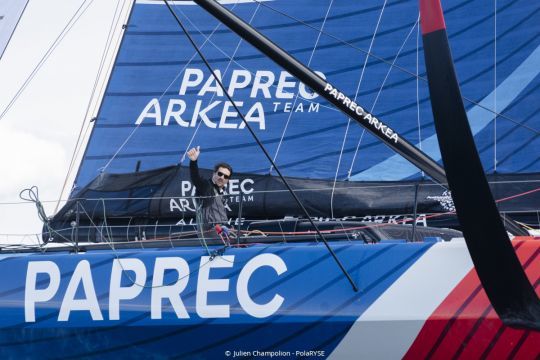
The skipper's first words
Winning The Transat CIC
"It's a crazy transatlantic race that has shaped the history of ocean racing. I've always dreamed of taking part. It went really well. It's an intense transatlantic race, with one of the most competitive fleets we've ever seen. I couldn't believe it. I'm really happy and it means a lot to me. Having lived here when I was young, it's great to be back in a country where I've lived, and by the sea too. I'm very proud of the team around me for giving me this opportunity. It's quite an achievement to have won two IMOCA transatlantic races. It's not neutral and it's due to a lot of hard work by the team and the passion we put into it."
Confidence on The Transat CIC
"As usual, the starts are average, and it takes a while to get going. I'm finding it hard to stay ahead. I had a lot of questions. Particularly about sail choices. It's not always easy. In extreme climates, when it's zero degrees, you think about it 500,000 times. I wasn't in total serenity and I had to think a lot. I had to limit my energy expenditure and ask myself questions to avoid making mistakes and achieve good trajectories. I managed to keep up with Charlie, who was close to Ireland. I was happy to keep up with him, because he's a reference. Out in the open sea, in difficult conditions, I saw that we were closer than I thought, and that's nice. I'm very proud of my trajectory, especially the seagull wing in the low-pressure area as we reached Newfoundland. I'm not proud of everything, but overall I give myself a good mark."
An air of Figaro on The Transat CIC
"It was a Figaro battle two or three times. The climb north along Ireland with Charlie not far away, that served as a reference. The rounding of the low-pressure system, very oceanic, too. And when Boris came back strong, downwind. Boris and I had the boats for it. I'm sure we all had our setbacks, in 30/35 knots downwind. It was intense, pleasant, that's what we're here for."
"The end was tough to see Boris come back. It's tricky to know if it's going to go wrong. Yesterday morning, I made a flying start, there was some wind, but I hadn't had a windvane for 2 days. I fell asleep and when I woke up, the boat was lying on its side. I was blown up and had to lift the boat. It stayed on edge for half an hour while the alarms went off all over the place, but I didn't hear a thing. I'd say I went as far as I could, but conditions are different from a round-the-world race."
More downwind than upwind, conditions similar to New York - Vendée Les Sables
"I hope I'm not being sold a close-hauled regatta for the return trip. Normally, the New York Vendée Les Sables will be mostly downwind with passing fronts. On the outward leg, the lows were fairly stationary, so that could be the case on the return. Normally, I'm expecting something hard and intense. In other words, we should have been sailing close-hauled in 50 knots, as is usually the case. We managed to get away from that and we managed to sail downwind in the breeze."
